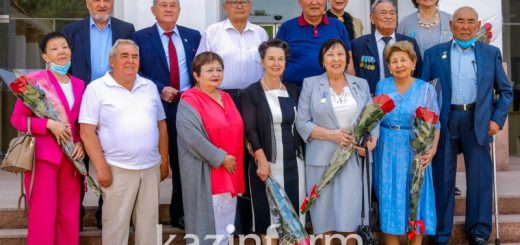В иностранном СМИ вышла новость о КазНМУ: Advancing Awareness and Policy in Kazakstan and in Central and Western Asia: Regional Insights and Progress
In a regional push for improved dementia support, Kazakhstan’s first Dementia Awareness Day highlights the progress being made across Central and Western Asia. In this blog we spotlight the work being undertaken in the region.
On September 24, 2024, during World Alzheimer’s Month, Kazakhstan marked a significant milestone with its inaugural Dementia Awareness Day. The event, hosted at City Clinical Hospital in Almaty, attracted over 240 attendees, including caregivers, social workers, and healthcare professionals.
This event was organized by the Association of Neurologists of the Republic of Kazakhstan, the Department of Nervous Diseases, the Department of Psychiatry and Narcology, alongside Asfendiyarov Kazakh National Medical University (KazNMU).
To open the day, the advisor to the Minister of Labour and Social Protection highlighted the critical importance of healthcare referrals, emphasising a timely diagnosis for individuals living with dementia. Other speakers included Professor B.B. Dzharbusynova, Head of the Department of Psychiatry and Narcology, and Chief Non-staff Specialist for Health Management in Almaty, as well as A.B. Seidanova from the Department of Physical Medicine and Rehabilitation.

In the session, S.T. Turuspekova, Head of the Department of Nervous Diseases at KazNMU and Chief Neurologist for the Ministry of Health, delivered a lecture titled “What is Alzheimer’s Disease and What Are the Risk Factors and Protective Measures?” with R.T. Tsoy, Assistant Professor of the Department of Nervous Diseases. A. Shchetkina, President of the Altsrus Foundation, discussed successful dementia initiatives in nearby regions.
An estimated over 100,000 people are expected to be living with dementia in Khazakstan, a figure which is expected to rise to over 350,000 by 2050. Globally, dementia remains underdiagnosed with an estimated 75% of people living with dementia without a formal diagnosis.
ADI are hopeful that this event could catalyse the development of a National Dementia Plan in Kazakhstan, an objective which was unanimously adopted by all 194 member states of the World Health Organization (WHO) in 2017. Well-funded dementia plans are an essential tool in addressing the complex healthcare challenges that dementia poses across governments, the healthcare system, and the wider society at large.
Kazakhstan’s commitment to raising awareness of dementia and the benefits of a timely diagnosis during World Alzheimer’s Month demonstrates important leadership across the Central Asian region.
 Progress is also being made in other areas. The government of Georgia recently committed to commence the development of a National Dementia Plan following joint advocacy by ADI and our member association, the Georgian Alzheimer’s Association (GAA). Dale Goldhawk participated in the GAA’s conference on ‘Dementia & Ageing with Dignity’, during which Dale delivered a keynote address and highlighted key findings from the 2023 World Alzheimer’s Report. Dale and the GAA also held a high level meeting with Tamar Gabunia, First Deputy Minister of Health, Social Affairs and Labour to discuss the development of the National Dementia Plan.
Progress is also being made in other areas. The government of Georgia recently committed to commence the development of a National Dementia Plan following joint advocacy by ADI and our member association, the Georgian Alzheimer’s Association (GAA). Dale Goldhawk participated in the GAA’s conference on ‘Dementia & Ageing with Dignity’, during which Dale delivered a keynote address and highlighted key findings from the 2023 World Alzheimer’s Report. Dale and the GAA also held a high level meeting with Tamar Gabunia, First Deputy Minister of Health, Social Affairs and Labour to discuss the development of the National Dementia Plan.
ADI’s member in Armenia, Alzheimer’s Care Armenia, announced the launch of their National Dementia Plan. The plan was launched at a press conference held by Gérard Pashayan, Chief Counselor to the Department of Psychiatry. During his remarks he highlighted the measures that could be taken by the government to slow increasing prevalence rates, as well as improve the quality of life and well-being for those already affected by dementia.
There is considerable activity within the region, as more and more countries move towards the development of a National Dementia Plan. ADI associations in Azerbaijan and Pakistan continue to make good progress, and ADI continues to work with the EURO and EMRO regional WHO offices to support governments in the region to develop and deploy National Plans.
 ADI would like to thank Kazakhstan for their efforts in raising awareness to dementia. Raising awareness efforts are often the first step in addressing stigma and encouraging those living with the condition to seek out an timely diagnosis. As the conversation around dementia care evolves, ADI urges Kazakhstan and its West Asian neighbours to prioritize the creation and implementation of national plans. Such initiatives are vital for fostering a comprehensive support network for those affected by dementia.
ADI would like to thank Kazakhstan for their efforts in raising awareness to dementia. Raising awareness efforts are often the first step in addressing stigma and encouraging those living with the condition to seek out an timely diagnosis. As the conversation around dementia care evolves, ADI urges Kazakhstan and its West Asian neighbours to prioritize the creation and implementation of national plans. Such initiatives are vital for fostering a comprehensive support network for those affected by dementia.





